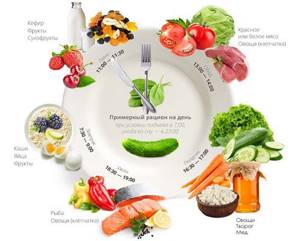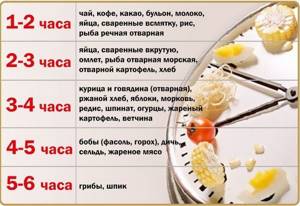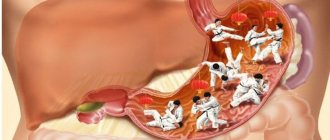Sometimes, without being a doctor, it is worth delving into the details of the digestion process, assessing how long food passes through the gastrointestinal tract, and comparing the absorption of foods by duration. Why know how to digest food quickly? The body is good at this matter, let it deal with it itself. Because the unconscious choice of unsuccessful combinations makes the stomach harder and provokes complications. Let's see why it is important to know the digestion time of food.
What determines the time it takes to digest food?
From several factors:
- chemical composition - carbohydrates are the fastest to be absorbed, their digestion begins in the oral cavity, followed by proteins, and the last of the list is fats, the breakdown of which requires many enzymes and the entire surface of the small intestine;
- water content in the product - the more water, the faster the absorption;
- food temperature - cold food is digested several times faster;
- method of culinary processing - raw foods are digested within an hour, and the assimilation of complex dishes with multi-stage preparation can take many hours;
- combinations of products - dishes made from products with approximately equal digestion time are quickly digested;
- uniformity of food intake and portion sizes - split meals with a break of no more than 3 hours and a volume of about 1 glass are considered the most physiological;
- habits of eating without feeling strong hunger - if the previous portion of food is not digested, the absorption of the next one slows down, fermentation processes develop.

Read on topic: What temperature should food be to stay healthy?
How long does it take for a person to digest food?
Fuel consumed in the form of food is essential for the functioning of the body. Without the necessary nutrients, cell development, restoration and protection are impossible. The foods you eat go a long way before they become building blocks needed by the body, but the energy required for processing and the time it takes to digest food greatly depend on the food class it belongs to.
The answer to the question of how long food is digested in the stomach may surprise you with its range: from half an hour to 6 hours. What determines the time it takes to digest foods? How long does it take for food to enter the intestines? After 7-8 hours of moving through the small intestine with parallel splitting, the food passes into the large intestine, where it can remain for about 20 hours. Let’s summarize how long it will take for food fuel to be processed into feces (we apologize for the terminology “not for the table”): around 1.5 days.
Digestion time in the stomach:

It is worth separating the concepts of “digestion” and “assimilation”. The first determines how long food remains in the stomach, undergoing processing in the form of breakdown into simple chemical compounds. The second involves the absorption of the obtained elements and their use to replenish energy needs, regenerate cellular tissues, and maintain the viability of organs and systems.
The completion date of protein processing differs significantly from the indicators of how much carbohydrates and fats are absorbed over the same period. For the first, the splitting process coincides with the moment of digestion, facilitating further absorption; for the second, digestion spreads to the intestines (complex carbohydrates), delaying penetration into the blood.
It is important to understand how much food is in the stomach, to distinguish between the time of digestion of foods and the time of assimilation. Doctors do not recommend mixing meals, throwing in a new batch of “fuel” until the old one is completely processed, and taking into account the total time, how long the food is digested in the stomach. In our article, digestion will also mean complete assimilation for ease of orientation.
Easy and difficult to digest foods
According to the time of assimilation, all products can be distributed as follows.
| Category | Products | Digestion time, hour |
| Easy to digest | Fruit and vegetable juices, vegetable broth | 15 – 20 minutes |
| Juicy raw fruits, eaten separately - watermelon, melon, cucumber, tomato, orange, grapes | from 30 to 60 minutes | |
| stone fruits – cherry, apricot, peach | up to 50 minutes | |
| raw vegetable salads without dressing | 40 minutes | |
| boiled vegetables - zucchini, squash, cauliflower | 30 – 40 minutes | |
| fatty fish, salted, boiled or baked - herring, salmon, trout | from 45 to 60 minutes | |
| lean fish – boiled and baked | up to 40 minutes | |
| eggs | 50 minutes | |
| root vegetables - beets, carrots, turnips | 50 minutes | |
| poultry meat without skin – turkey, chicken | up to 1 hour | |
| Moderately digestible | avocado | up to 2 hours |
| boiled whole grains – rice, buckwheat, millet, corn, pearl barley, oatmeal | up to 90 minutes | |
| legumes – peas, beans, chickpeas, lentils | up to 90 minutes | |
| sunflower seeds, sesame, soy | up to 2 hours | |
| meat broth, cocoa | up to 2 hours | |
| dairy products - milk, low-fat cottage cheese and cheese | up to 2 hours | |
| nuts – peanuts, cashews, walnuts | up to 3 hours | |
| raw vegetable salad with butter | from 1.5 hours | |
| rye bread and potatoes, ham | 3 hours | |
| Hard to digest | hard fatty cheeses | 4 hours or more |
| fatty and fibrous meats - horse meat, beef, lamb, pork | 5 or more hours | |
| fried meat and mushrooms | from 4 hours | |
| Indigestible | vegetable fiber, fruit skin, hard cartilage |
Read on the topic: How to behave correctly after a hearty lunch: good and bad habits
Useful tips on proper nutrition.
I want to end my article with interesting facts; I believe that they can change our eating behavior and at the same time improve our health.
You should know it:
- — water drunk on an empty stomach enters the intestines within a few minutes.
- - fats in the form of oils are not absorbed in the body, and by enveloping food, they complicate its dissolution by stomach acid.
- - Do not drink water, tea or other drinks when there is food in the stomach. Additional liquid entering the stomach dilutes the gastric juice, which makes it more difficult to digest food. This leads to the fact that by increasing the load on the gastrointestinal tract, undigested foods enter the intestines along with liquid and begin to ferment and even rot.
- — to speed up the digestion process and improve it, you need to chew your food thoroughly.
- — protein foods are best consumed warm, since warm food is digested in about 2-3 hours, and the time for protein breakdown is also within this time.
- — if nuts and seeds are soaked in water overnight and then crushed, they are digested faster.
Articles related to the topic:
- Tips: How to stimulate fat burning?
- How to burn calories to lose weight?
- What processes occur in the human body when losing weight.
- The secret to a beautiful figure is the right habits.
We recommend reading

Add a comment
How to speed up food digestion time?
It is necessary to speed up digestion only when there are problems and the presence of the disease has been confirmed by a doctor. In all other cases, it is better not to interfere with processes regulated by nature itself, so as not to harm yourself with rash actions.
If there is such a need, you can use the following methods:
- a glass of clean water on an empty stomach, maybe with a few drops of natural lemon juice (if there is no heartburn and increased acidity of gastric juice) - this remedy “starts” digestion after a night’s rest;
- a glass of fresh kefir on an empty stomach - does the same thing, only softer (cannot be used by those who do not digest milk well);
- along with heavy and dense dishes, use a lot of seasonings and spices - hot pepper, mustard, pickled ginger or others as desired, spices stimulate the release of digestive enzymes, and things will go faster;
- the temperature of the food should be close to body temperature - too hot food burns the delicate mucous membrane, and cold food does not have time to break down in the stomach;
- during meals, drink a little hot liquid - unsweetened tea or clean water (it is not advisable to drink water after eating, this reduces the concentration of gastric juice and enzymes, digestion is delayed);
- a small “sandwich” of a slice of fresh ginger and salted lemon before eating – the bitterness improves digestion;
- always chew food thoroughly and calmly (read more here) to facilitate the work of subsequent departments;
- eat foods rich in fiber, which accelerates the movement of the food bolus - bran bread, legumes, dried fruits, flaxseed, as well as fruit and vegetable juices.
Read on the topic: Methods for managing appetite and ways to reduce it
What affects the duration of food digestion?
- Temperature. Hot foods take longer to digest than cold ones. For example, okroshka requires less time to be digested by the stomach than borscht or oven-baked casserole.
- Meal time. Food is most actively processed during the day, during lunch. Food taken at breakfast and dinner takes longer to reach the intestines.
- Treatment. In boiled and fried foods, the enzymes characteristic of raw food are destroyed during the cooking process, and the stomach takes one and a half times longer to digest them.
- Combination. Their processing depends on how and with what a person mixes products. For example, an apple takes half an hour to digest, and hard cheese takes five hours.
- And the body processes a soft-boiled egg faster than a hard-boiled one.
Important! There is no need to eat until the stomach is empty of the previous portion of food. Then the problem of excess weight will be solved by itself and without heavy and strict diets it is easy to lose the hated kilograms.
When I eat I am deaf and dumb
This saying is true in all cases. When a person eats, he should not do anything else. Nutrition is the most important process of maintaining life. Food is the “fuel” on which each of us lives. Anything that interferes with digestion should be put aside:
- reading while eating;
- watching TV shows or news on a computer monitor;
- communication by phone;
- clarifying relationships and speaking in a raised voice.
Food swallowed “under stress” cannot bring any benefit. When a person is involved in emotions - no matter whether they are positive or negative - the whole body reacts to this. The heart speeds up, the lungs breathe faster, and the stomach and intestines contract. Normal digestion against the background of a scandal is completely impossible. The food “stays too long” and rotting begins with all the ensuing consequences.
Read more: How to eat to make your stomach easy?
Food digestion table

On this page we will look at the digestion time of various foods. I think many people will be interested in this and every person should have an idea about it.
Knowing the digestion time of foods is very important to maintain your health. If you know the digestion time of food, you will be able to prepare dishes that will be digested normally in your stomach and will not poison the body with toxins from undigested food residues.
What about other countries?
For many peoples, food laws are dictated by climate. The Jews were especially successful in this. Their food is divided into 3 types: meat, dairy and neutral - cereals and fruits and vegetables. In the kitchens of many restaurants, and some at home, there are 2 refrigerators - separately for meat and dairy products.
Before the invention of the refrigerator, consuming meat and milk separately protected Jews from food poisoning in 24-hour heat. Over time, it acquired religious sanctification, but the principles remained unchanged.
For those whose digestion is slow, it makes sense to adhere to this division. Meat and milk are digested completely differently, since the proteins have a completely different structure and different enzymes and digestive juices are required. Simultaneous “loading” of the digestive system with dissimilar proteins and fats can significantly disrupt digestion in those who already have a defect. Therefore, it is advisable to consume meat and dairy foods separately, mixing them only with neutral ones - cereals, pasta, vegetables.
You can also avoid complex gravies and sauces that contain a lot of superheated fats. It is convenient to bake meat with fruit - organic acids not only make it soft, but add flavor and are an excellent substitute for sauce.
To “tune” digestion, not much is required - just don’t throw anything into your mouth.
In continuation of the topic, be sure to read:
- What medications should I use for increased gas formation?
- Causes of bloating and increased gas formation, treatment methods
- Methods for improving digestion and metabolism: foods, drugs, herbs
- Rectal fissure: causes, symptoms and treatment of pathology
- Treatment tables (diets) No. 1-15 according to Pevzner: food tables and diet
- Herbs for the intestines: benefits and use for various diseases
- Carminative drugs for adults and children: list of medicines
- Irritable bowel syndrome: symptoms and treatments
- More about hemorrhoids: causes, symptoms and treatment methods
- How much time should pass between meals?
Day for digestion!
The body metabolizes proteins, fats and carbohydrates and their combinations at different rates. Try a simple experiment: eat an apple as a snack today and time the time when your hand reaches for something edible again. Most likely, within an hour you will want to snack again. And the next day, along with an apple, eat, for example, peanut butter, which adds fat and protein to your snack. They will help you last much longer without food.
Without going into details of the processes of food digestion, we will only note that according to the rating of digestion speed, carbohydrates are in first place, since they are necessary to provide all cells and organs with energy. Therefore, the body takes them from food first. Second and third places were shared by proteins and fats, respectively. That is, fats take the longest to pass through the digestive tract.
On average, it takes from 24 hours to three days for food to completely go through the entire digestion process. However, the speed of digestion of the same dish may vary among different people. It depends on the health of your intestines and other digestive organs, your metabolic rate, age, whether you get enough sleep, whether you are stressed, whether you drink a lot of water, and your activity level.
In addition, some studies have shown differences in the speed of digestion between men and women. In the stronger sex, food passes through the large intestine for 33 hours, in women – 47 hours.
Digestion process - stages by hour
Digestion of food can be divided into three phases of the digestion process - head, gastric and intestinal.
- The first begins at the sight of food, the sensation of smells or its presentation . At this moment, the cerebral cortex is stimulated, sending taste and smell impulse signals. At this stage, gastric secretion increases from the maximum by another forty percent. The increase in acidity in the stomach has not yet begun to be extinguished by food, but saliva is already secreted in the mouth.
- The second phase lasts from three to four hours. It is caused by the presence of food in the stomach, its distension. Stretching the gastric walls activates muscle tissue reflexes, which entails an increase in the secretion of gastric juice.
- Next, the transition to the intestinal phase, consisting of two stages - excitatory and inhibitory . Partially digested by the stomach, food enters the duodenum, causing the release of intestinal gastritis. The fibers are set in motion, which tighten the sphincter of the stomach, blocking the excessive flow of food into the intestines.











